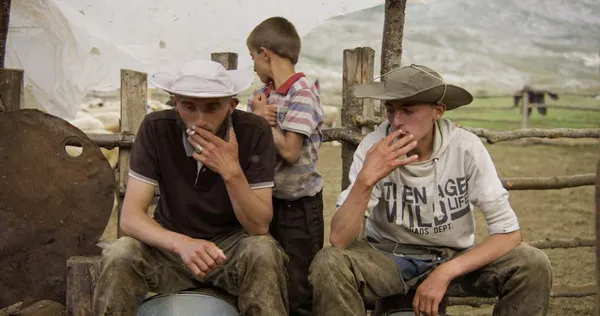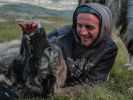Eye For Film >> Movies >> The Mountain Won't Move (2025) Film Review
The Mountain Won't Move
Reviewed by: Amber Wilkinson

High on a mountain in Macedonia, it’s the hazy days of summer but there’s nothing lazy about the activity that is going on there. Three young brothers, Zekir, Zarif, and Zani – and from time to time an even smaller fourth one, Basir – are busily at work tending their family’s cows and sheep with the help of a pack of Sharr working dogs. Zekir – described not unreasonably as “hero” in the end credits – is the eldest (at about 20). He shoulders most of the high herding duties with his teenage sibling Zarif, while the younger brother Zani, tends to the animals at the sketchy cabin they share at night.
Documentarian Petra Seliskar takes us into their world as they go about their business. From the chatter we learn that there are parents elsewhere, as well as a sister, who we see visit from time to time, but it’s clear that the jobs the boys have are long-standing and intended to be done without any more senior oversight. While a bit more grounding in the boys’ family life would be welcome, Seliskar gains from this approach, since we feel fully immersed in the brothers’ world who seem largely oblivious of the cameras as they look after their livestock through the day and share meals, games and their thoughts at night. The filmmaker and her crew deserve a lot of credit for even managing to capture this lifestyle – not to mention following it for five years – given the mountains are difficult to access and live on even for the brothers.

The Sharrs, with names including Hitler, Turbo and Stalin, are rough and ready working animals and, in many ways, so are these lads. When we see them “playing” with the dogs it isn’t particularly gentle, but the love that they have for them jumps from the screen. When a breeder is late returning a dog has borrowed, Zarif notes: “I miss her as if I were missing a kidney.”
Given how much testosterone there is on tap – and sexual frustrations are periodically referred to – it’s eye-opening to see how much softness there is on display. The brothers care about and look out for one another through virtually every action. While they don’t always agree on things, arguments are shown to be quickly sorted, energy wasted, you might say.
These kids are basically living their philosophy, which is in line with the natural environment, even though mobile phones have even made their way to the mountainside – although you need to climb pretty high for any hope of reception. Despite their companionable existence, there are frictions between the workaholic Zekir and the less keen Zarif, who is entertaining aspirations of leaving the mountainside altogether even though that will mean an additional burden falling on his older sibling. Although that provides an arc of sorts, Seliskar is more interested in letting us walk a mile or two – uphill – in the boys’ shoes.
One notes you’re born on day one, by day three you’re in the pub and on day four it's time for work. It encapsulates the sense of growing up fast on the mountainside, where even the youngest is seen puffing on a cigarette – although his brother seems more concerned that he’s drinking coffee without sugar. The film is full of joyously specific moments like this. From cheese-making to one of the younger brothers attempting to build a model of his dream house with unwelcome help from a pixieish goat.
Seliskar lets the natural soundtrack of the mountain dominate, but there are nice periodic additions from Iztok Koren that feel in keeping with the sense of place and further add to the ambience. This is a precarious life for many reasons and the future may not exactly look bright but whatever it holds you sense these lads will have one another’s backs.
Reviewed on: 11 Apr 2025















